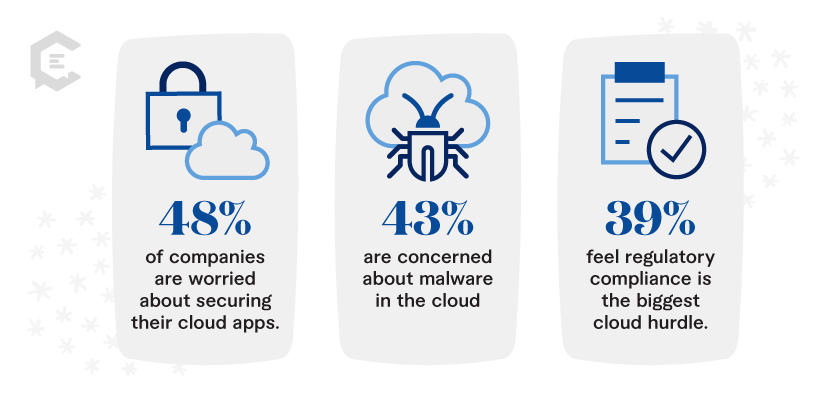What do birth certificates, house deeds, car deeds, and land titles have in common? They all contain sensitive personal information that people love to hold in the palms of their hands. Since the days of stone tablets, people have kept their most important information on physical documents.
For some cloud providers, this can present a challenge: getting people to trust a computer thousands of miles away with their precious business data. When it’s on your laptop, it’s different. Even when you keep it on an internal server, it feels closer, more accessible, and secure. But when it comes to the cloud, some feel their data and systems are vulnerable.
One powerful tool companies use to overcome hesitancy to embrace the cloud is content marketing.
Effective content marketing earns the trust of your customers by being helpful, transparent, and confident. When you have gained their trust, leads will feel comfortable transitioning important data and systems to your cloud environment. Here’s how content marketing can play a compelling role in building customer trust, strategies for using it, and how to differentiate your business with content.
The Importance of Trust and Security in Cloud Computing
Trust and security are central to the cloud computing business model because:
- Businesses need to know their digital assets are available for running core processes
- Companies need a secure environment to build trust with their customers, especially when it comes to managing their personal or business information
- Businesses often process customer data in the cloud and have to conform to compliance regulations
Recent statistics highlight the importance of these challenges: 48% of companies are worried about securing their cloud apps. Also, 43% are concerned about malware in the cloud, and 39% feel regulatory compliance is the biggest cloud hurdle.

The key to alleviating these worries is using a content strategy that speaks to your target market’s specific pain points.
Key Strategies to Use Content Marketing to Build Trust and Address Security Concerns
Content marketing can build trust in your cloud offering by showing customers the following:
- How your cloud services work
- How you secure client data and that of their customers
- How your cloud security systems work in different use cases

Strategy 1: Explaining How Your Cloud Services Work
For many people, cloud environments are like the theory of relativity: They kinda-sorta understand what it is but have difficulty putting it in words. You make your processes more tangible by explaining how your cloud services work. This, in turn, inspires customer trust because they can picture how and why their data is secure.
For example, suppose you help companies transition from on-premise computing to Amazon Web Services (AWS). Since so many businesses are getting into data analysis, you want to create awareness around Amazon S3 and Redshift. Your awareness campaign could involve a series of infographics and use cases that highlight helpful best practices.
Explain Your Offering in Simple Terms
The key is to keep it simple. Using the S3 and Redshift example, you can simply say that S3 is like a hard drive and Redshift is a computer that accesses S3’s data. Is this an oversimplification? Yes. But your objective isn’t to flex your technical prowess. You just want your customers to understand the components of your solution. This way, they can better understand how your security measures protect them.
Strategy 2: Explain How You Secure Client Data and That of Their Customers
Even though there are several ways to secure cloud environments, you want to keep this simple as well. For S3 and Redshift, you could begin by explaining AWS PrivateLink and Amazon’s encryption service in simple terms, like this:
“PrivateLink works like a VPN. You log in to get direct access from your office or another cloud location. S3 automatically encrypts all object uploads. And for Redshift, your data gets AES 246 bit encryption. It’s also secured while in transit by HTTPS SSL encryption.”
Follow up with brief descriptions of how data security technologies work. To further educate your customers, create additional articles on these topics using a pillar topic cluster strategy. Go on to create explainer videos using the written content you have created as your research to make the information accessible to an even wider audience.
It’s also a good idea to address common mistakes that could compromise cloud security. For instance, people often provide too many permissions when working with S3 buckets. As Mark Nunnikhoven, VP of Cloud Research at Trend Micro, puts it, “Every breach you’ve seen associated with [S3 buckets] is because somebody accidentally assigned too permissive a policy.”
Since permissive policies are part of the public discourse, you could include a brief bit about why avoiding them strengthens security.

Strategy 3: Explaining Security Solutions with Use Cases
The first step in leveraging use cases in your content marketing strategy is figuring out which ones are most similar to what your target customers are dealing with. This often involves focusing on industries. For instance, you can create a series of use case articles that target the manufacturing industry.
You could also choose your use cases based on current events or trends. For example, suppose supply chain issues are plaguing your target customer. You can write a use case about automating supply chain management using a cloud-based ERP like NetSuite.
Regardless of your use case, always tie it back to the security theme. For instance, suppose you’re writing an article about using NetSuite to automate supply chain management. Begin by explaining how NetSuite can automatically pinpoint the least-expensive vendor using supply chain factors. Then mention how NetSuite’s encryption APIs and multi-factor authentication (MFA) keep data secure and bad actors away.
How Content Marketing Can Make Your Cloud Computing Business Stand Out
Content marketing helps your cloud computing business stand out if you avoid generic descriptions and use specific examples that resonate with your target market.
For instance, if you say, “Our cloud solutions enable scalability,” you’ve merely said what customers have read 87 times from your competition.
Be more specific by dedicating one page to each industry you serve. For example, on a page focusing on e-commerce, you can emphasize content delivery networks (CDNs). You could include headings such as:
- How CDNs Provide Images and Videos of Your Products
- How to Keep Your Product Descriptions Up-to-Date with CDNs
- How CDNs Help Your E-commerce Site Load Faster
In this way, you’re not just a cloud provider but also an e-commerce and CDN expert.

Case Study: How Cisco Used Content Marketing to Build Customer Trust
Cisco had recently acquired a new technology and rebranded it as Cisco Webex Experience Management. But the cloud giant needed to engage customers with insightful, captivating content. With this kind of content, Cisco could clearly show how Webex could solve customer problems.
Cisco used ClearVoice to create blogs, white papers, and case studies that showcased an expert, trustworthy voice.
As a result, Cisco got expert-level storytelling that customers could connect with. ClearVoice delivered the content according to Cisco’s timetable—without sacrificing authenticity or quality.
Embrace Content Marketing to Foster Trust and Stand Out
By clearly explaining your cloud offering and security options and catering your content to specific audiences, you can build trust and stand out from the competition. By doing this regularly, you provide customers with up-to-date, relevant information. At the same time, you give search engine algorithms what they like to see: recent, helpful content.
With regular, specific content, you give your customers a tangible picture of your services and security options. You also empower them with the simple language they need to endorse your service as they speak to other stakeholders.
See the difference experienced cloud technology freelancers make by connecting with ClearVoice today.



